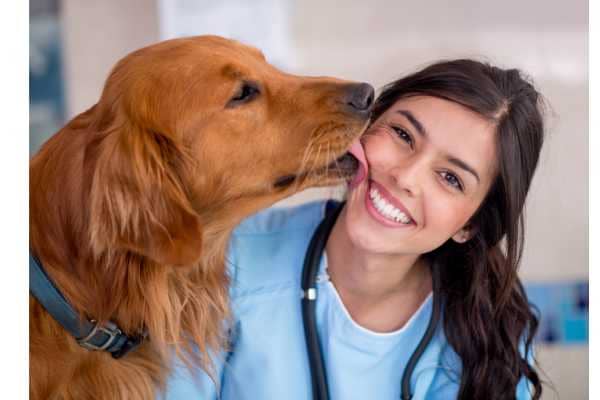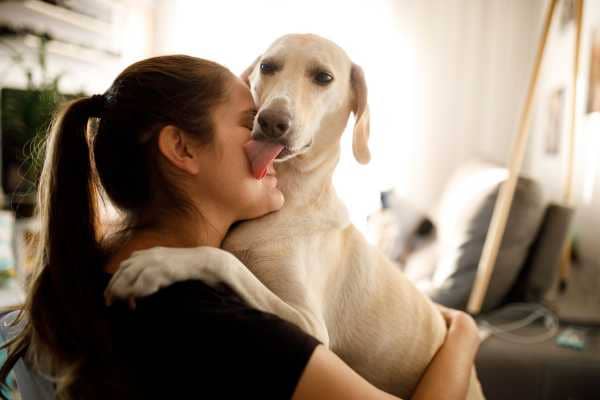Curiosity and Sensory Exploration: Why Is My Dog Licking Everything
Dogs have an innate tendency to explore their environment, but when this exploration manifests as excessive licking of various objects, it can be concerning for pet owners. Understanding the reasons behind this behavior is crucial in addressing and managing it effectively. This article aims to explore the potential factors contributing to dogs’ excessive licking habits.
Firstly, natural instincts and sensory exploration play a significant role in dogs’ licking behaviors. Licking allows them to gather information about their surroundings, as their tongues contain an abundance of taste buds and receptors. Additionally, physical health reasons such as allergies, dry skin, or pain can also trigger excessive licking.

Moreover, emotional and behavioral factors may contribute to this behavior. Dogs may lick excessively due to anxiety or boredom, using it as a coping mechanism or a means of self-soothing. Attention-seeking behavior is another possible reason for this habit.
To address excessive licking in dogs, identifying the underlying cause is paramount. Implementing appropriate training techniques and providing mental stimulation can help redirect their focus from incessant licking towards healthier alternatives.
Key Takeaways
- Dogs have a natural instinct to explore and gather information through licking, which can lead to excessive licking behavior.
- Excessive licking can be a sign of underlying health issues, such as allergies or dental problems, and can also be a manifestation of anxiety or stress.
- Providing mental stimulation and environmental enrichment, such as interactive toys and puzzle feeders, can help redirect a dog’s focus away from excessive licking.
- Positive reinforcement training techniques, like clicker training, can be effective in redirecting excessive licking behavior and promoting alternative ways for dogs to seek attention.
Natural Instincts and Sensory Exploration
Natural instincts and sensory exploration drive dogs to engage in behaviors such as licking everything around them. Dogs have an exceptional sense of smell, which allows them to detect scents that humans cannot perceive. Licking objects enables dogs to gather information about their surroundings, as they can taste different substances present on surfaces.

This behavior is especially common in puppies, who use their mouths as a way to explore the world. Moreover, dogs have specific taste preferences and may lick objects that contain appealing flavors or textures. For example, salty or sweet residues left on furniture or floors might attract a dog’s attention and encourage licking behavior.
While this behavior is natural for dogs, excessive licking could indicate underlying health issues or anxiety, so it is important for owners to monitor and address any concerning patterns of licking in their pets.
Physical Health Reasons
Common physical health reasons for excessive licking can include underlying skin allergies, gastrointestinal disorders, or dental issues.
Allergic reactions can lead to itching and discomfort in dogs, causing them to excessively lick their bodies as a way to alleviate the irritation. Skin allergies may be triggered by certain foods, environmental factors such as pollen or dust mites, or contact with substances like cleaning products or fabrics.
Additionally, dental issues such as gum disease, tooth decay, or oral infections can cause pain and discomfort in dogs. Licking objects may provide temporary relief from dental pain or help dislodge food particles stuck between teeth.
It is important to address these physical health reasons promptly to ensure the well-being of our canine companions and prevent further complications.
Emotional and Behavioral Factors
Emotional and behavioral factors contributing to excessive licking in dogs can stem from underlying anxiety, stress, or boredom. Dogs may resort to excessive licking as a coping mechanism for these emotional states.
To address this behavior, training techniques can be utilized to teach dogs alternative behaviors that are more acceptable. Positive reinforcement methods such as clicker training or rewarding desired behaviors with treats can be effective in redirecting their attention away from excessive licking.
Another approach is environmental enrichment, which involves providing mental and physical stimulation to alleviate boredom and reduce anxiety. This can include interactive toys, puzzle feeders, or regular exercise routines.
By implementing these strategies, dog owners can help their pets find healthier outlets for their emotions and reduce the frequency of excessive licking behavior.
Attention-Seeking Behavior
Attention-seeking behavior in dogs can manifest as persistent and intrusive actions aimed at capturing the focus of their owners or others around them. This behavior may stem from various emotional and behavioral factors, including separation anxiety and boredom relief.

Dogs with separation anxiety often resort to attention-seeking behaviors as a means to cope with their distress when left alone. By engaging in excessive licking, they seek reassurance and comfort from their owners.
Additionally, dogs may lick objects or surfaces out of boredom, as a way to alleviate their pent-up energy or frustration. Providing appropriate mental stimulation and physical exercise can help address this issue by preventing boredom-related attention-seeking behaviors.
Furthermore, implementing positive reinforcement techniques for desirable behaviors will promote alternative ways for dogs to seek attention without resorting to excessive licking.
How to Address Excessive Licking
One effective approach to addressing excessive licking in dogs is through the implementation of environmental enrichment and mental stimulation techniques. By providing a stimulating environment, dogs are less likely to engage in attention-seeking behaviors such as excessive licking. Here are some strategies that can help:
- Provide interactive toys: Toys that dispense treats or require problem-solving can keep your dog mentally engaged and reduce the need for excessive licking.
- Offer puzzle feeders: These devices require dogs to work for their food, which not only provides mental stimulation but also helps address potential food allergies by slowing down eating.
- Consider dental health: Dental issues can cause discomfort and lead to excessive licking. Regular dental check-ups, teeth cleaning, and providing appropriate chew toys can help maintain oral hygiene.
Implementing these strategies can help redirect your dog’s energy towards more productive activities while addressing any underlying issues such as food allergies or dental problems.
See also:
- Puppy Love Chronicles: Heartwarming Stories Of Dogs Changing Lives
- Why Do Dogs Lick Your Feet
- A Fun and Effective Way to Improve Your Dog’s Communication Skills
Frequently Asked Questions
Can excessive licking be a sign of a more serious medical condition?
Excessive licking in dogs can be caused by medical conditions or behavioral triggers. Medical causes may include allergies, skin infections, or gastrointestinal issues. Identifying the underlying cause is crucial for appropriate treatment and management of the condition.
Is it normal for dogs to lick themselves after eating or drinking?
It is normal for dogs to lick themselves after eating or drinking as part of their hygiene habits. Dog owners should clean their pet’s paws and muzzle regularly to maintain cleanliness. Behavioral training techniques can be used to discourage excessive licking.
Can a change in diet help reduce a dog’s excessive licking behavior?
A change in diet may help reduce a dog’s excessive licking behavior. The potential causes of this change in behavior could be food allergies, sensitivities, or an imbalance in their nutritional intake. Further investigation by a veterinarian is recommended to determine the underlying cause.
Are there any non-medical interventions that can help reduce a dog’s excessive licking?
Behavior modification and natural remedies can be effective in reducing a dog’s excessive licking. Training techniques such as positive reinforcement and desensitization can help modify the behavior, while natural remedies like calming pheromone sprays or herbal supplements may provide relief.
Can excessive licking be a sign of anxiety or stress in dogs?
Excessive licking in dogs can be a sign of anxiety or stress. Anxiety management and behavioral modification techniques are effective interventions to reduce this behavior, promoting the well-being of both the dog and its owner.
